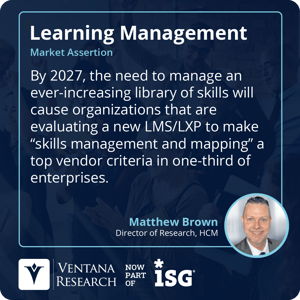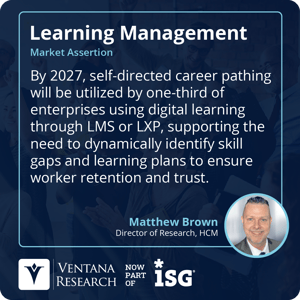The workforce of today has been very clear with their needs, wants and expectations. They need to feel seen, valued, heard, included and empowered. They want to work in an organization that feels like a community and aligns with their personal value systems. Importantly, they expect access to technology and to be developed and supported as they navigate their careers.
Learning opportunities can dramatically impact workers’ overall experience, engagement and likelihood to stay. This doesn’t mean that just making training accessible will yield the full benefits. The learning experience is as much about the technology as it is about the organizational culture, emotional intelligence of management and support for ongoing reinforcement. If learning experiences lack quality, consistency or balance, you’ll find less positive movement in worker satisfaction, engagement and retention.
The workforce of today has signaled that a one-size-fits-all approach to learning falls short. Employees learn in different ways and at different speeds, and may require an array of learning modalities and depth of reinforcement. Workers also expect access to development across a wide range of topics and skills that may not be within the scope of the job they do today. We assert that by 2027, the need to manage an ever-increasing library of skills will cause one-third of enterprises evaluating a new learning management system or learning experience platform to make “skills management and mapping” a top vendor criterion.
learning modalities and depth of reinforcement. Workers also expect access to development across a wide range of topics and skills that may not be within the scope of the job they do today. We assert that by 2027, the need to manage an ever-increasing library of skills will cause one-third of enterprises evaluating a new learning management system or learning experience platform to make “skills management and mapping” a top vendor criterion.
Consider these insights regarding learning in the workplace:
- Training expenditures in the U.S. totaled $101.8 billion in 2023.
- Average per-employee annual learning and development spend worldwide is $1,280.
- 59% of employees around the globe are not engaged. 18% are actively disengaged.
- 59% of workers are experiencing moderate burnout.
- 83% of workers say they would stay longer at a company with a skills-first approach to training.
Employee perspectives have shifted toward a more long-term view of career and life journey. Many employers have long-standing cultures rooted in learning, and many are evolving in that direction. In consideration of the workforce of today and tomorrow, learning experiences are critical for success because they:
- Help talent stay relevant and competitive. An inclusive, personalized and flexible learning experience adapts as employee needs change. Traditionally, experiences related narrowly to an employee’s current workplace role or job. Expanding offerings without reservation supports employee aspirations, signaling commitment to their success. Learning technology enables more dynamic experiences without overwhelming the administrative teams managing the process.
- Strengthen worker loyalty and retention. It is not necessary to employ a strategy that involves a master class level of training for workers in all roles or even to invest in the
 newest, most feature-rich learning technologies. Rather, it is critical to show that you care about workers’ well-being and ongoing development. Take the time to truly understand the needs of the workforce and invest in the right solutions to meet those needs. By 2027, self-directed career-pathing will be utilized by one-third of enterprises with an LMS or LXP, supporting the need to dynamically identify skill gaps and learning plans to ensure worker retention and trust.
newest, most feature-rich learning technologies. Rather, it is critical to show that you care about workers’ well-being and ongoing development. Take the time to truly understand the needs of the workforce and invest in the right solutions to meet those needs. By 2027, self-directed career-pathing will be utilized by one-third of enterprises with an LMS or LXP, supporting the need to dynamically identify skill gaps and learning plans to ensure worker retention and trust.
- Boost worker well-being. Learning experiences, if well crafted, also reduce employee stress and burnout by creating a psychologically safe training environment. Technology is key to creating a space where workers can show up and be themselves, ready to learn without fear of judgment, retaliation or ridicule. Advances in learning technology enable employees to signal their stress levels or potential for burnout and be met with recommendations for learning activities designed to help them cope effectively.
- Elevate the customer experience. We all have customers to serve in our roles. Some customers are internal (other business units), and some are external. When the customer has a great experience, workers are more likely to stay and be invested in the shared successes. Simon Sinek said, “Customers will never love a company until the employees love it first.” Happy, highly engaged workers directly improve the customer experience, which can yield higher retention and revenue.
- Support efforts to adapt to change and remain flexible. Employees around the globe understand and expect that change occurs at a rapid pace. They expect the same pace as it relates to their own development, growth and career progression.
In addition to benefitting the employee experience, learning opportunities provide insights to improve financial performance. With well-crafted learning experiences comes access to data, which can be maximized to understand the true health of business-like employee behavior, knowledge capital, skill gaps and performance trends. Value can be fully realized by correlating these insights with other key business metrics such as customer retention, customer satisfaction, product consumption and adoption rates.
While there are many factors in the equation for employee retention, it’s wise to be mindful of–and not underestimate–the power of learning experiences. Too often, enterprises miscalculate the value of investing in learning and spend twice as much time and effort chasing the wrong issues in support of increasing employee engagement, retention and satisfaction. When economic uncertainty or discourse arises, most organizations take a page from the same 30-year-old playbook, which leads to cutting back on investment in the learning and development function. In recent years, there’s been somewhat of an awakening, and many organizations are evolving to consider learning and development as a non-negotiable investment to power the business.
Enterprises constantly work to balance people and profits. Resist the temptation to undervalue the impact of learning experiences on the health of the business and safeguard the commitment to the development of the workforce. Always make time to garner feedback from your workforce regarding learning experiences and continue investing in creating meaningful interactions with your workforce through learning.
Regards,
Matthew Brown
 learning modalities and depth of reinforcement. Workers also expect access to development across a wide range of topics and skills that may not be within the scope of the job they do today
learning modalities and depth of reinforcement. Workers also expect access to development across a wide range of topics and skills that may not be within the scope of the job they do today newest, most feature-rich learning technologies. Rather, it is critical to show that you care about workers’ well-being and ongoing development. Take the time to truly understand the needs of the workforce and invest in the right solutions to meet those needs. By 2027, self-directed career-pathing will be utilized by one-third of enterprises with an LMS or LXP, supporting the need to dynamically identify skill gaps and learning plans to ensure worker retention and trust.
newest, most feature-rich learning technologies. Rather, it is critical to show that you care about workers’ well-being and ongoing development. Take the time to truly understand the needs of the workforce and invest in the right solutions to meet those needs. By 2027, self-directed career-pathing will be utilized by one-third of enterprises with an LMS or LXP, supporting the need to dynamically identify skill gaps and learning plans to ensure worker retention and trust.








